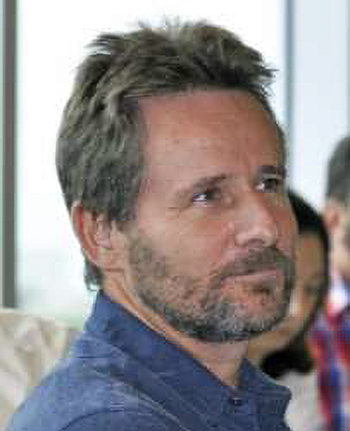Graduate Certificate in Environmental Education
The Graduate Certificate in Environmental Education (EE) will appeal to students and professionals working in formal and informal education, the natural sciences, and communication.
Contact Information

Bryan Nichols
Associate Professor
Department of Curriculum and Instruction
Office Location: EC MC12 - 207E
Campus: Jupiter
The certificate can be earned:
- As a supplement or as electives for graduate students in any master’s or doctoral program.
- On its own by non-degree seeking students, including professionals who don’t currently have the time to pursue a 36 credit Master’s Degree in Environmental Education. See https://www.fau.edu/graduate/apply/non-degree/
The four courses in the certificate will improve key content knowledge, boost science education pedagogy, cover effective lesson planning and curriculum design, enhance sustainability education leadership skills, survey new education research, and explore the exciting potential of environmental education in our increasingly challenging world. Students interested in environmental justice education, wildlife education, place & community-based education, indigenous education, and global environmental challenges will find these topics infused throughout.
All of the coursework can be completed online, and there are optional in-person experiences involving community partners working in the impressive range of high-quality natural sites in SE Florida. Environmental education here features beaches, the Everglades, the Loxahatchee National Wild and Scenic River, as well as wildlife like sea turtles, wading birds, alligators, and manatees.
Program & Courses
| Number | Course Name | Synchronous Sessions | Typically Offered |
|---|---|---|---|
| SCE 6345 | Perspectives of EE | 6 | fall evenings |
| SCE 6344 | Advanced Methods of EE | 6 | spring Saturdays |
| SCE 6644 | Trends and Issues in EE | 4 | fall evenings |
| SCE 6151 | Science: Elementary & Middle School 1,2 | 12 | spring evenings |
SCE 6345 Perspectives of Environmental Education
 Examine the past, present, and exiting potential of environmental education and its relatives through readings, synchronous and asynchronous discussions, nature journaling, and local service. Covers key social & ecological concepts, the social and environmental challenges of the Anthropocene, and leadership for sustainability and resilience education.
Examine the past, present, and exiting potential of environmental education and its relatives through readings, synchronous and asynchronous discussions, nature journaling, and local service. Covers key social & ecological concepts, the social and environmental challenges of the Anthropocene, and leadership for sustainability and resilience education.
SCE 6344 Advanced Methods of Environmental Education
Visit with park staff, nature center educators, and wildlife rehabilitators who design programs and educate schoolchildren and the public in creative and amazing ways. Covers design, delivery, and critical analysis of environmental education lessons and programs. Highly recommended in-person opportunities to learn and network at local EE providers, select spring Saturdays.
SCE 6644 Trend & Issues in Environmental Education
Immerse yourself in the latest environmental and science education literature with collaborative annotation and synchronous and asynchronous seminar discussions. Learn to design effective EE units, lessons, and assessments using backwards planning. Measure EE outcomes using culturally responsive and equitable program evaluation, get IRB certified for education research, and examine the growing links between nature, education, and wellbeing.
SCE 6151 Science: Elementary & Middle School 1,2 (EE themed section)
Boost your pedagogy by learning techniques for modern, effective science education focusing on better integration of formal (classroom) and informal (park, museum, nature center) settings. The engaging and effective research-based pedagogies covered are readily adaptable to students of all ages.
1 Be sure to choose the special spring EE themed section of SCE 6151 for the EE certificate.
2 With permission from the EE Coordinator, students with specific audiences in mind may substitute pedagogy-focused courses such as Effective Practices in Early Childhood Environmental Education (EEC 6327), an upcoming course on Marine Science Education (SCE TBD), or a course in environmental justice, adult, secondary, or exceptional science education.
Courses in the Graduate Certificate in Environmental Education incorporate the North American Association for Environmental Education (NAAEE) Professional Development of Environmental Educators: Guidelines for Excellence and the program is currently being prepared for accreditation by NAAEE.
